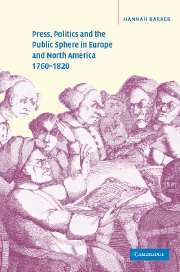Book contents
- Frontmatter
- Contents
- Notes on contributors
- Acknowledgements
- Introduction
- 1 The cosmopolitan press, 1760–1815
- 2 The Netherlands, 1750–1813
- 3 Germany, 1760–1815
- 4 England, 1760–1815
- 5 Ireland, 1760–1820
- 6 America, 1750–1820
- 7 France, 1750–89
- 8 The French revolutionary press
- 9 Italy, 1760–1815
- 10 Russia, 1790–1830
- Index
3 - Germany, 1760–1815
Published online by Cambridge University Press: 05 July 2009
- Frontmatter
- Contents
- Notes on contributors
- Acknowledgements
- Introduction
- 1 The cosmopolitan press, 1760–1815
- 2 The Netherlands, 1750–1813
- 3 Germany, 1760–1815
- 4 England, 1760–1815
- 5 Ireland, 1760–1820
- 6 America, 1750–1820
- 7 France, 1750–89
- 8 The French revolutionary press
- 9 Italy, 1760–1815
- 10 Russia, 1790–1830
- Index
Summary
From the 1760s, the public sphere in Germany became increasingly politicised. Certain strata of German society became receptive to the idea of civil activities undertaken for the common good, displayed a new sensitivity to contemporary political and social conditions and their shortcomings, and were more prepared to voice criticism. Events such as the Seven Years War and the American War of Independence stimulated this development. The dramatic occurences of the revolutionary and Napoleonic age gave it a further boost. In particular, the war with Napoleonic France had a profound impact on society, bringing with it occupation and haggling about territory, constant changes of ruler and a far-reaching reform policy which awakened and sharpened the political awareness of broad sections of the population. For example, the Confederation of the Rhine was the ‘subject of debate in all the journals, during which, society was quickly politicised’. These upheavals cleared the deck for a debate on political basics such as national identity, legal equality and political participation.
This newly created public was to a large extent the domain of the enlightened intelligentsia, the Gebildeten, at least in the later eighteenth century. This group was highly diverse in terms of origin, profession, type and level of income. What unified the Gebildeten as a group was education. As a rule, they had studied at one of the enlightened universities. Familiarity with the contemporary and classical culture ensured the homogeneity of this group.
- Type
- Chapter
- Information
- Publisher: Cambridge University PressPrint publication year: 2002
- 4
- Cited by



